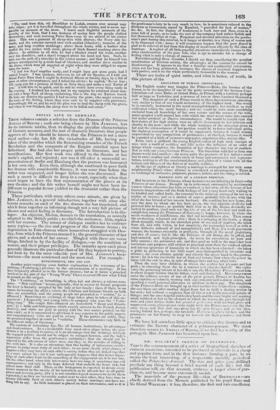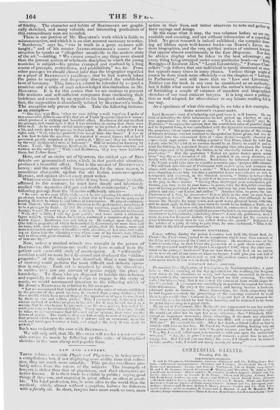MR. DOGARTICS SKETCH Or 111:ETIIOYF.N. Tills is the commencement an
series of biographical sketches of eminent musicians, intended to be produced at intervals in a cheap and popular form, and in the first instance forming a part. by no means the least interesting, of a respectable monthly periodical called the Polytechnic Journal. The size anti price (one shilling) preclude any thing beyond a brief record of each life; but the publication will, on that account, embraee a larger class of pure chasors, and become more extensively useful. The materials of the present life—that of BEETHOVEN—are chiefly derived from the Memoir published by his pupil Itias and I his friend WEGELE1I ; it has, therethre, the first and rare excellence of fidelity. The character and habits of BEETHOVEN' are graphi- cally sketched, and many valuable and interesting particulars of this extraordinary man are revealed. There is one portion of Mr. HOGARTH'S work which is liable to misconstruction, and which it is on that account necessary to notice. " Beethoven," says he, " was in truth in a great measure self- taught ;" and of his master ALBRECHTSBERGER'S course of in- struction he speaks as " altogether unsuitable to the modern state of the art,"—adding, " We cannot conceive any thing more absurd than the present system of scholastic discipline to which the young musician is subject—his genius cramped and confined by a long course of precepts, restrictions, and prohibitions," &c. &c. From other passages we should almost infer that the biographer regarded as a proof of BEETHOVEN'S excellence, that he had scarcely taken the pains to acquire and frequently disregarded the established laws of harmony. This, however, cannot be intended by s3 good a musician and a critic of such acknowledged discrimination as Mr. Hooawrin It is fin- this reason that we are anxious to prevent idle students and self-sufficient composers from vindicating their indolence and conceit by an appeal to his imagined authority. In fact, the supposition is abundantly refuted by Bruntovrs's works. The exception only proves the rule. Take the following instance as an example- ". One day,' says Ries, ' when we were taking a walk together, I spoke of two comeclitive.lifths in one of his first set of Violin Quartets (that in C minor) which produced a striking and beautiful effect. Beethoven did not recollect the passage, and would have it that I was mistaken in saying that there were fifths in it. As he usually carried music-paper in his pocket, I asked him for a bit, and wrote down the passage in four parts. Beethoven seeing that I was right, said, ' Well, who has prohibited the use of fifths like these?' 1 was at a less how to take the question. Ile repeated it several times; till at last I answered, greatly surprised at his putting it, ' Bless me they are thrbidden by the very fundamental rules of harmony!' Still he insisted on knowing by whom. I said, By Marpurg, Kirnharger, Fux, every theorist who has ever written On the subject.' ' Well,' cried Beethoven, 'day may have 'forbidden them, but I allow them.'" Here, out of an entire set of Quartets, the critical eye of Rrrs detects one grammatical error, which, in t/mt particular situation, produced a beautiful effect. That is the amount of BEETnovrs's heresy : and the same wilful transgression, for the saute reason, is sometimes chargeable against the old Indian masters—against HANDEL, and against almost every great writer. Whatever even Ma-rimy-EN hims,h'may have, perlmps jestingly, affirmed to the contrary. he must have deeply and laboriously studied "the mysteries of fugue 1:1(1 double counterpoint ;" as the following passage front the Memoirs sufficiently attests- " So early- as the year MG, while as yet he was pursuing his studies under an obscure teacher at Bonn, he made a short visit to Vienna for the purpose of hearing Mozart, to whom he had letters of introduction. He played extempore berm: Mozart; who paid very little attention to the pm farm:thee, imagining it to he a piece got by heart. At last the young musician, piqued be this indif- ference, begged Mozart to give Lim subject. Mozart mutterea to himself. 4 Well, stay it little, I will try your metal ; ' and wrote down a chromatic fugue subject, which, taken 3,as::swards, contained a counter-suhjest for a double fugue. Beethoven tvas nut taken in. Re worked upon the sulject (the hidden properties of which he immediat,ly discovered) for more than half an hour, with such three, originality, and gehius, that his hearer, more and more Con lotooled, and almost breathlei with atteutiou, at last rose, and ;lik- ing on tiptoe into the adjoining rhont, where some of his friends were sittiag, said to them with great emotion, ' Attsad to that .ssotng man; you will hear of him one days Now, unless a musical miracle was wrought in the person of BEETHOVEN, this performance couti cul:• have resulted from the patient and successful study of counterpoint. A " self-taught " musician could no more have discerned and displayed the " hidden properties" of the subject here described, than a man ignorant of anatomy could perform the most difficult and delicate opera- tion in surgery. Each art is acquired by study, by dissection ; in neither case can any amount of genius supply the place of knowledge. To those who are disposed to indulge this delusion, and especially to all who really ch...sign to engage in the study of music, we would recommend attention to the following advice of Sir JOSHUA REV Not.OS in relation to his own art- " Let me recommend that implicit obedience to the rules of art, as established by the practice of the great masters, he exacted from young -t ;oleo: ; that those models which have passed throngh the approbation of ft:s.,s, cos, 1,1..red by them as :are and certain guides. This, I ant costi lent, is I he ts.Iy method of making progress in the ar!.: for it may he mail cloy a as a maxim, that he who begins by presurnits on his omsa powsrs, has etslel studies PI soon no lie commenced them. very opportunity, therefi.re, koala be taken to di,eountenance that !Ida: and vulgar opinion, that rules s:-e the fetters of grin The truth is, they mere letters only to men of no geni ; as that armour %Odell upon the strong is a defence and an ornament, up at the weak and misshapen becomes a load, ;gal cripples the body it was itsale to protect."
Such was eminently the case with Ilmirnovi:N.
We will only add, that Mr. Iloe %win will render a most ac,. -pt- able service to music by following up this series of biographical sketches in the same cheap and popular form.



























 Previous page
Previous page